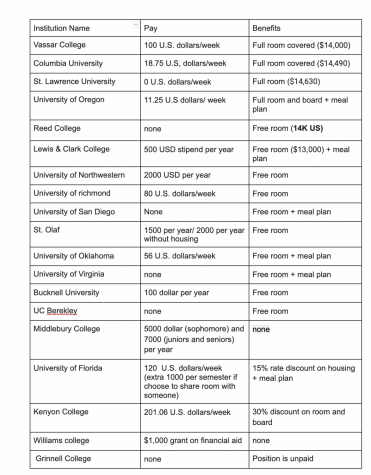Are our Residential Advisors being compensated enough?
Tree branches hiding the Nott Memorial.
March 4, 2021
****Any views expressed in this article are solely the opinions of the writer, not necessarily the opinions of the Editorial Board of the newspaper.****
Residential Advisor (RA) is a job position that’s offered to students across all colleges and universities in the United States. It functions as a leadership opportunity as well as financial aid to outstanding student leaders who need monetary assistance for their education.
I’ve served Residential life for the past two years in Davidson house, and I will be the Head RA for Richomond in the coming year. I am currently in the committee for RA selection and I also co-run the RA instagram page. Being a student on full scholarship in Union College, I first applied for this position to earn extra money to support myself, and to fulfill the work-study hours that were included as part of my financial aid package.
Over my time as an RA, I have come to realise that the duties that the position entails far exceed the compensation that we receive for it. Similar opinions have been expressed by my fellow team members who I have since then interviewed. Currently, Union pays its RAs 200 dollars bi-weekly (1000 U.S. dollars per term) as well as 3999 dollars off the room and board fees which is actually only 27 percent off on the entire sum. This is far less than the compensation to RAs in peer schools. Excluding the 27 percent discount we receive in housing, we are only paid 20 U.S. dollars more than a usual work study student while the scope and hours of our duties far exceeds that number. The normal duty of an RA include the bulletin boards, door decs, one-on-one with resident, weekly report, weekly staff meeting, program planning and evaluation, building-wide event, bi-weekly meeting with Resident Director, in-service meetings, Life Safety Inspections, duties, duty logs, incident reports, late-night lock-outs, move-ins and hall closing at the beginning and end of the term, as well as handling roommates conflicts and individual concerns with residents. Take one weekend duty for example, an RA needed to be on duty in the office (up until this term where policy has changed) from 8-11, stay up till 2am for rounds, and be on stand-by to handle any lockouts or incidents until 10am in the morning. A duty itself already consists of 6 hours of actual labor and 8 hours of stand-by. If you do one or two duties per week, it will already exceed the 10 hours-mark, not having counted all the paperwork you have to complete in addition to duties. We work far more than an regular 8 hours work-study student, yet we are only making 20 dollars per week more than them.
While researching for this article, I reached out to 23 Resident Advisors from over 18 colleges and universities across the United States. I have collected data on their pay and benefits in the accompanying table.

Out of all the colleges, many RAs shared similar sentiments toward feeling exploited with the amount of work they are asked to perform while being underpaid. Two RAs, from Middlebury college and Kenyon College respectively, stood out to me in particular. They had both had a pay raise after student’s advocacy. Remaining anonymous, an RA from Middlebury expressed that “There was a significant increase the year after because numerous RAs, many of whom were international students, complained that we were not being fairly compensated for the work we had to do.” Middlebury used to pay their RA 3000 U.S. dollars in 2018, and there had been an increase of 2000 USD for first-year RAs and 5000 USD increase for juniors and seniors since then. They pay their Residential Director and Head Residential Director this amount. Another RA I interviewed was John Ortiz Vargas from Kenyon College, “Pre-pandemic, we were paid a rate of ~$9.05 per hour on an average of 18 hours a week, but in the Fall of 2020 we started getting paid ~$11.17 on an average of 18 hours per week. We organized through the rising student workers Union at Kenyon and that’s how we got our raise.” It came to my attention that Union does not allow professors, students, or workers to unionize, and therefore, I thought writing this article would be my best shot of getting the pay raise we deserve. RA’s pay rate must be re-evaluated and be raised. I urge that school leaders will take this into consideration for the pay-rate of next year.
When I first became an RA in my sophomore year, I had to come back to college two weeks prior to the beginning of the Fall term. Those two weeks were the most rigorous period of training that I have ever gone through. It was two weeks of waking up at 8am and ending the day at 6pm. We had over 8 hours of training everyday for two weeks. The training included scenarios workshops for an active shooter and sexual harassment amongst other things, and and awareness training for fire inspections, LGBTQ+ awareness. All of this added up to 105 hours which was unpaid. The only kind of compensation we were given was our lunch and dinner. In addition to the training, there was an additional 26 hours of actual labor for freshman and upperclassmen move-in day. It was not optional, nor volunteer based. We were required to complete those hours. As I talked to RA Liana Ralli ’22 , she recalled these training being the most exhausting two weeks of her union life, “Waking up everyday at 8am for two weeks was emotionally, psychologically and physically tiring. I was in the dining hall when I called my dad and started crying to him about how exhausted I feel. The school hadn’t even started and I was already drained.”
Under United States federal law, “If you are required to attend a training program for work, you must be paid for that time being. For example, if your employer requires all new employees to attend an orientation training or requires current employees to attend sexual harassment training, that time must be paid”. “The only time when training would not count as working time is when all four of these criteria are met: Attendance is outside normal hours, Attendance is voluntary, The training is not job-related, No other work is concurrently performed”. RA is in every shape or form is considered a job, as we file federal tax annually; and Union College employees are protected under NY state law. If all mentioned above is true, then there is a 1048 dollars of unpaid labor of 2 weeks per Resident Advisors in 2019-2020 that was never paid for, using the numbers calculated above.
From my own observation and conversations I have had, more than half of the current RAs are either people of colour or international students coming from lower income backgrounds and using this opportunity to earn money while also adding to their resume. In the face of the unprecedented year that we have had, it bothers me that minorities and people of colour are occupying more than 50 percent of an underpaid job, in a predominantly white college. Universities can get away with underpaying their students because these unprivileged students need the money to support their education; sometimes, it’s not even their choice because work-study was given to them as part of their financial package. International students are more likely to accept less than what they deserve because many of them come from challenging backgrounds, where coming to the United States has been their goal for their entire life. For them, they are more likely to tolerate the aggression due to how “grateful” they are of being here. Not only so, those who are most vulnerable, in the sense that they receive the highest level of financial assistance, can be most susceptible to exploitation under our administration. A previous Concorcondiensis article covered the struggles of Carolina Missura ’22. She was denied monetary compensation for her summer RA job because her financial aid already covered the room and board, which was part of summer RA’s compensation. At the end of her summer RA job, she received 0 dollar for the work she did. We should re-evaluate why in a white-dominant college, minorities are the majority who are taking up jobs that under-pay their workers. It seems expedient that a liberal art school is apathetic towards the needs of such students who are facing various kinds of emotional and economic hardship. In order to dismantle the systematic inequalities, these conversations must be had within the leadership levels of Union College.
RAs are the first respondent to many situations, from alcohol and drug overdose to accidents, violent encounters and injuries. We are also responsible for our residents’ well-being and enforcing ever-changing rules, especially during the COVID-19. Resident Advisors, made up of many hard-working students, are not asking for an extravagant and grand pay-raise, we just want to be compensated for the amount of work we put in, and to be heard and recognized.







